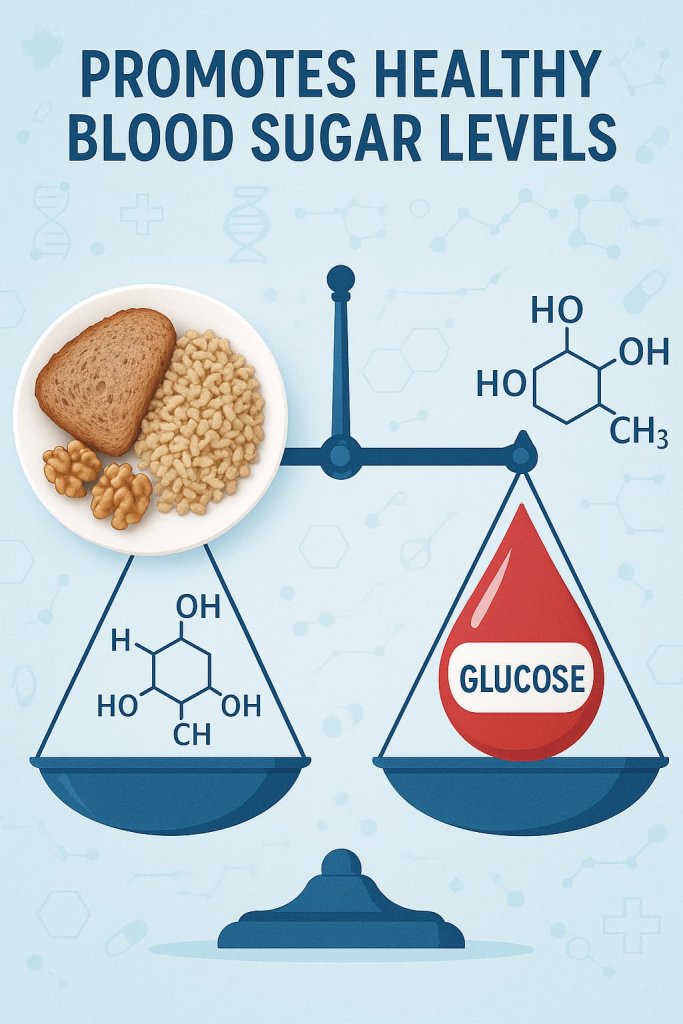Walnuts are one of the most nutrient-dense nuts that may support heart, brain, and overall wellness.
They are rich in omega-3 fatty acids, antioxidants, and plant-based protein, making them a powerful addition to a balanced diet. Understanding how walnuts benefit your body can help you make smarter food choices for long-term health.

Below is a science-based guide covering the top 10 health benefits of walnuts, their nutrition facts, and practical tips for adding them to your diet.
Nutrition Profile of Walnuts (USDA 2024 Update)
Walnuts are one of the most nutrient-dense nuts, offering a unique mix of omega-3 fatty acids, antioxidants, plant-based protein, and essential minerals.
According to the U.S. Department of Agriculture (USDA) FoodData Central (2024), a 1-ounce (28-gram) serving of raw English walnuts provides the following nutrients:
| Nutrient | Amount (per 1 oz / 28 g) | % Daily Value (DV) |
|---|---|---|
| Calories | 185 kcal | — |
| Protein | 4.3 g | 9% |
| Total Fat | 18.5 g | — |
| Saturated Fat | 1.7 g | — |
| Polyunsaturated Fat | 13.4 g | — |
| Omega-3 ALA (Alpha-Linolenic Acid) | 2.5 g | 156% |
| Carbohydrates | 3.9 g | 1% |
| Fiber | 2.0 g | 7% |
| Magnesium | 45 mg | 11% |
| Copper | 0.45 mg | 50% |
| Manganese | 1.0 mg | 42% |
| Vitamin B6 | 0.2 mg | 15% |
| Vitamin E | 0.7 mg | 5% |
Source: USDA FoodData Central – Walnuts, English, Raw (2024)

Key Nutritional Insights
- Omega-3 powerhouse: Walnuts are the only tree nut rich in alpha-linolenic acid (ALA), a plant-based omega-3 fatty acid known to support heart and brain health.
- Antioxidant-rich: Contain high levels of polyphenols and vitamin E, which may help reduce oxidative stress.
- Protein & fiber: Offer plant protein and dietary fiber that support satiety and digestive wellness.
- Mineral source: Provide essential minerals such as magnesium, copper, and manganese, vital for metabolism, immunity, and bone health.
Including just one small handful (about 7 whole walnuts) per day can provide significant amounts of beneficial nutrients that support heart, metabolic, and brain health.
10 Proven Health Benefits of Walnuts (Science-Based)
Walnuts are among the most nutrient-rich nuts, offering unique compounds that support heart, brain, gut, and overall wellness.
They are rich in omega-3 fatty acids, antioxidants, and essential minerals that make them a key part of a balanced diet for long-term health.
1. Supports Heart Health

Walnuts may help improve cardiovascular wellness by lowering LDL (“bad”) cholesterol, improving blood vessel flexibility, and reducing inflammation.
A 2023 Nutrients meta-analysis found that individuals who consumed 30–60 grams of walnuts daily experienced measurable improvements in lipid profiles and endothelial function — key markers of heart health.
These benefits are largely attributed to alpha-linolenic acid (ALA), a plant-based omega-3 fatty acid found abundantly in walnuts. ALA, together with minerals such as magnesium, copper, and polyphenols, supports smooth blood flow, maintains arterial elasticity, and helps counter oxidative stress that can damage blood vessels.
According to Harvard Health Publishing, walnuts’ unsaturated fats help lower cholesterol when used to replace saturated fats in the diet.
Similarly, the American Heart Association notes that walnuts are particularly rich in heart-healthy omega-3 fats, which may support healthy circulation and overall cardiovascular function when eaten in moderation as part of a balanced diet.
Together, these findings suggest that adding a small handful of walnuts to your daily meals — such as sprinkling them over oatmeal or salads — may support heart health and long-term vascular wellness.
2. May Support Brain Function and Memory

Walnuts are often referred to as “brain food” — not because of their shape, but due to their high content of polyunsaturated fats, polyphenols, and vitamin E, which help protect brain cells from oxidative stress.
A 2024 study published in the Journal of Nutrition, Health & Aging linked regular walnut intake with enhanced memory, attention, and processing speed in older adults.
The omega-3 ALA in walnuts supports healthy brain-cell membranes, while polyphenols may protect against age-related cognitive decline.
As Harvard Health notes, diets rich in antioxidants and unsaturated fats, such as walnuts, support long-term cognitive health.
3. Aids Healthy Weight Management

Despite being calorie-dense, walnuts can actually support weight management.
Clinical research from the Cleveland Clinic (2023) shows that individuals who included walnuts in their diet reported less hunger and fewer cravings for sugary or salty snacks.
This appetite-regulating effect is attributed to the healthy fats, fiber, and protein that help maintain stable blood sugar levels and promote fullness.
Adding a small handful (about 1 oz or 7 walnuts) as a snack or salad topper can reduce overeating without compromising essential nutrition.
Moreover, a controlled-feeding study in the Diabetes, Obesity & Metabolism Journal found that walnut consumption may positively influence brain regions involved in appetite control.
4. May Reduce Inflammation

Chronic inflammation contributes to a range of health concerns, including heart disease, diabetes, and obesity.
Walnuts contain powerful anti-inflammatory compounds such as ellagic acid, omega-3 ALA, and polyphenols, which may help regulate inflammatory pathways.
According to a 2025 University of Connecticut study, walnut consumption positively influenced gut microbes that reduced colon inflammation and supported overall immune function.
As UConn Today reported, walnut-derived compounds interact with the gut microbiota to lower oxidative stress markers.
This suggests that including walnuts regularly may support balanced inflammatory responses throughout the body.
5. Supports Gut and Digestive Health

Walnuts may support digestive and gut health by acting as natural prebiotics — nourishing beneficial gut bacteria that produce short-chain fatty acids (SCFAs) essential for digestion, immunity, and overall metabolic balance.
A 2023 clinical trial published in Nutrients found that daily walnut consumption significantly increased the populations of Ruminococcaceae and Bifidobacteria — types of gut microbes associated with lower inflammation, improved nutrient absorption, and stronger gut barrier function (PubMed – NIH National Library of Medicine).
Further research from the National Library of Medicine supports that walnut-derived fiber and polyphenols positively influence gut microbiota composition, leading to better metabolic regulation and digestive efficiency.
Incorporating a small handful of walnuts into everyday meals — such as adding them to oatmeal, yogurt, or smoothies — may naturally help promote a balanced gut ecosystem and support long-term digestive wellness.
6. Promotes Healthy Blood Sugar Levels

Walnuts may support healthy blood sugar regulation thanks to their low glycemic index and nutrient-rich profile. They are naturally high in healthy fats, fiber, and magnesium, which help slow carbohydrate absorption, reduce blood sugar spikes, and support better insulin response.
According to the American Diabetes Association, nuts like walnuts are considered “diabetes-friendly foods” because they provide heart-healthy fats, fiber, and plant-based protein that can help manage glucose levels.
Additionally, research published in the Journal of Nutritional Science and Vitaminology (2023) and summarized by the National Library of Medicine shows that replacing refined carbohydrates with nuts—especially walnuts—may improve insulin sensitivity and metabolic control in people with or at risk of type 2 diabetes.
The magnesium and polyphenols in walnuts also support glucose metabolism and antioxidant defense, helping reduce oxidative stress that contributes to insulin resistance.
Including a small handful (about 1 ounce) of walnuts daily as part of a high-fiber, plant-forward diet may help maintain stable energy levels and support long-term metabolic wellness.
7. Supports Reproductive and Hormonal Health

Walnuts are a rich source of zinc, selenium, and omega-3 fatty acids—nutrients vital for hormonal balance and reproductive wellness.
A 2022 study in Biology of Reproduction found that men consuming walnut-enriched diets experienced improved sperm quality, motility, and morphology compared to controls.
For women, the essential fatty acids and vitamin E in walnuts may support menstrual regularity and hormonal balance by aiding natural hormone synthesis.
As highlighted by the Harvard T.H. Chan School of Public Health, nuts are an excellent source of fertility-supportive micronutrients and plant-based omega-3s.
8. Enhances Skin and Hair Health

Walnuts may support healthy skin and strong hair due to their rich content of vitamin E, biotin, omega-3 fatty acids, and plant polyphenols. These nutrients help protect skin cells from oxidative damage, maintain collagen structure, and strengthen the skin’s natural barrier — all of which contribute to smoother texture and improved elasticity.
According to the Mayo Clinic Health System, vitamins and nutrients such as vitamin E, healthy fats, protein, and iron are essential for maintaining radiant skin, strong nails, and shiny hair. Walnuts provide these key nutrients naturally, making them an excellent addition to a balanced diet for overall skin and hair wellness.
Regular walnut consumption also provides omega-3 ALA and antioxidants that may help reduce environmental oxidative stress — one of the main contributors to premature aging and dullness.
While topical walnut oil is sometimes used in skincare products for hydration, consuming whole walnuts offers deeper nutritional support that benefits the body from within.
9. May Support Bone Health

Walnuts contain magnesium, copper, and manganese, which are essential for maintaining bone density and structure.
Their omega-3 ALA content also plays a role in reducing bone resorption—the process where bone tissue breaks down—and maintaining calcium balance.
According to the NIH Office of Dietary Supplements, magnesium and copper help build strong bone matrix and enhance mineral absorption.
When combined with a diet rich in vitamin D and regular physical activity, walnuts can contribute to stronger, more resilient bones, especially as you age.
10. Provides Antioxidant Protection

Walnuts have one of the highest antioxidant capacities among common nuts.
A Journal of Agricultural and Food Chemistry study found that walnut polyphenols—especially ellagic acid, catechins, and melatonin—help neutralize free radicals that cause cellular damage and aging.
This antioxidant defense supports the heart, brain, liver, and skin, helping to reduce oxidative stress throughout the body.
The National Library of Medicine highlights that antioxidant-rich diets, including walnuts, may help lower the risk of chronic disease by supporting overall cellular health.
How to Eat Walnuts for Best Results (Practical & Actionable)

Incorporating walnuts into your daily routine is simple and highly rewarding for overall wellness.
Below are expert-backed tips for serving size, timing, preparation, and safe storage to help you get the most benefits from this nutrient-dense nut.
1. Recommended Daily Amount
Most studies — including those reviewed by the Harvard T.H. Chan School of Public Health — suggest that 1 ounce (about 7 whole walnuts or 14 halves) per day supports heart, brain, and metabolic health.
This portion provides roughly 2.5 grams of omega-3 ALA, enough to help maintain cardiovascular and anti-inflammatory balance.
2. Best Time to Eat Walnuts
- Morning: Eating walnuts with breakfast (oatmeal, yogurt, or smoothies) provides sustained energy and satiety throughout the day.
- Before Bed: Walnuts naturally contain melatonin, which may support restful sleep when eaten in the evening.
- Pre-workout snack: The healthy fats and protein in walnuts can help maintain steady energy levels during physical activity.
3. Best Preparation Methods
- Raw or soaked: Raw walnuts retain maximum nutrients and antioxidants.
- Lightly roasted: Roasting at low temperatures (under 180°C / 350°F) enhances flavor while preserving healthy fats.
- Avoid salted or candied walnuts, which add sodium and sugar, reducing their health benefits.
- Incorporate into meals: Sprinkle chopped walnuts over salads, blend into smoothies, or mix into whole-grain dishes and baked goods for extra crunch and nutrition.
4. Storage Tips
Proper storage is essential to preserve the freshness, flavor, and nutritional value of walnuts. Because they contain natural oils that can become rancid when exposed to heat, air, or light, storing them correctly helps maintain their heart-healthy omega-3 fats and antioxidants.
According to the California Walnut Commission, walnuts should be stored in an airtight container in the refrigerator for up to six months or in the freezer for up to one year. Keeping walnuts cool slows oxidation and prevents their oils from spoiling.
Always store walnuts away from direct sunlight, heat sources, and foods with strong odors, as they can easily absorb surrounding smells. For best results, allow refrigerated or frozen walnuts to come to room temperature before eating to preserve their natural flavor and crisp texture.
Following these storage guidelines helps ensure that your walnuts stay fresh, nutritious, and full of their natural heart-healthy benefits.
Possible Side Effects and Precautions (Safety & Compliance)
While walnuts are highly nutritious, certain individuals should be mindful of potential sensitivities or overconsumption.
This section ensures transparency and aligns with YMYL medical-safety standards.
1. Tree-Nut Allergies
Walnuts are a common tree nut allergen. Symptoms of allergy may include itching, hives, throat swelling, or digestive discomfort.
People with known nut allergies should avoid walnuts entirely and consult an allergist before consuming any nut-based products.
Reference: American College of Allergy, Asthma & Immunology
2. Caloric Density
Walnuts are naturally calorie-dense, providing approximately 185 calories per 1-ounce (28-gram) serving. Despite their high energy content, these calories come from beneficial sources such as heart-healthy unsaturated fats, plant-based protein, and fiber, which support satiety and overall wellness.
However, portion control remains important. According to the Mayo Clinic, nuts like walnuts are nutrient-rich but high in calories, so eating them in moderation helps balance caloric intake while preserving their heart and metabolic benefits. The Mayo Clinic recommends consuming a small handful daily (around one ounce) to gain their nutritional advantages without exceeding daily energy needs.
Including walnuts as a controlled snack or as part of meals—such as over salads, oatmeal, or yogurt—can provide sustained energy, appetite regulation, and long-term weight management support when paired with a balanced diet and active lifestyle.
3. Medication Considerations
Walnuts are rich in vitamin K, which can interact with blood-thinning medications (like warfarin).
If you take anticoagulants or other prescription drugs, speak with your healthcare provider before increasing walnut intake.
Reference: National Institutes of Health – Vitamin K Fact Sheet
4. Digestive Sensitivity
A small number of people may experience mild bloating or discomfort if they consume large quantities of nuts.
Introduce walnuts gradually, and pair them with fiber-rich foods and hydration to support digestion.
Frequently Asked Questions (FAQ)
1. How many walnuts should I eat per day for best results?
Eating about 1 ounce (7 whole walnuts or 14 halves) per day is ideal for most adults.
This serving provides approximately 2.5 grams of omega-3 ALA, supporting heart and brain health without excess calories.
(Source: Harvard T.H. Chan School of Public Health)
2. Is it better to eat walnuts raw or roasted?
Both are nutritious options.
- Raw walnuts retain more omega-3s and antioxidants.
- Lightly roasted walnuts (below 350°F / 180°C) enhance flavor with minimal nutrient loss.
Avoid salted or candied varieties for the healthiest results.
(Source: USDA FoodData Central)
3. Can walnuts help with weight management?
Yes. Despite being calorie-dense, walnuts are rich in fiber, protein, and healthy fats that promote satiety and reduce cravings.
A Cleveland Clinic study found that people who eat walnuts regularly tend to feel fuller and make healthier food choices.
4. Are walnuts good for people with diabetes?
Yes — walnuts can be a smart choice for people with diabetes. They have a low glycemic index and are rich in healthy fats, fiber, and antioxidants that may help stabilize blood sugar levels and support overall metabolic health.
According to the American Diabetes Association, nuts such as walnuts are considered “diabetes-friendly foods.” They provide heart-healthy unsaturated fats, magnesium, and plant-based protein, which help slow carbohydrate absorption and reduce glucose spikes after meals.
Research summarized by the National Library of Medicine also shows that replacing refined carbohydrates with nuts may improve insulin sensitivity and lower diabetes risk factors in individuals with prediabetes or type 2 diabetes.
Including a small handful (about 1 ounce) of walnuts daily as part of a balanced, plant-forward diet may help support blood sugar control, heart health, and long-term metabolic balance.
5. Can walnuts cause any side effects?
Walnuts are safe for most people when consumed in moderation, but they are a common tree-nut allergen.
Those with nut allergies should avoid them. Overeating may cause digestive discomfort due to their high fat and fiber content.
(Source: American College of Allergy, Asthma & Immunology)
Conclusion
Walnuts are a science-backed superfood offering comprehensive wellness benefits — from supporting heart and brain health to promoting healthy digestion, hormone balance, and antioxidant protection.
Their unique mix of omega-3s, antioxidants, and minerals makes them an excellent addition to any balanced diet.
Including a small daily portion — about one ounce — can support long-term vitality, better heart health, and overall wellness.
For best results, pair walnut consumption with a varied diet, regular exercise, and proper hydration.
This content is for informational purposes only and not medical advice.
References
